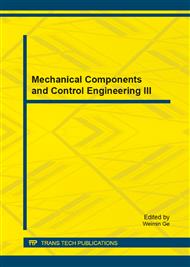p.1581
p.1587
p.1591
p.1597
p.1601
p.1605
p.1611
p.1615
p.1621
Comprehensive Evaluation of Thermal Power Units Based on Nonlinear Principal Component Analysis
Abstract:
In order to improve the operation and management level of thermal power units, and to achieve the goal of saving energy and reducing consumption, the nonlinear principal component analysis (PCA) was proposed to assess the operating condition of fossil-fired power plants comprehensively, which can resolve the problem on the evaluation of multiple indicators. This method improves the traditional PCA by eliminating the relativity. Moreover, this paper applies the nonlinear PCA to evaluate the operating state of power plants, which can reduce the dimensions of the indicators and abstract the principal components. It can provide the high reference value for the power generation group on how to implement saving energy, optimal operation, indicators evaluation and competition in thermal power units. The practical example shows that the proposed method is effective.
Info:
Periodical:
Pages:
1601-1604
Citation:
Online since:
October 2014
Authors:
Price:
Сopyright:
© 2014 Trans Tech Publications Ltd. All Rights Reserved
Share:
Citation:


